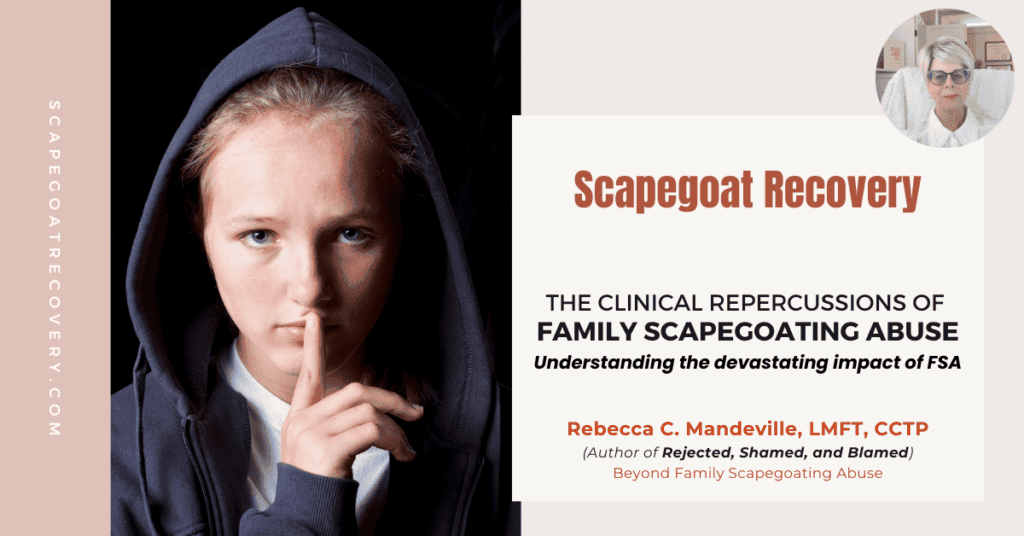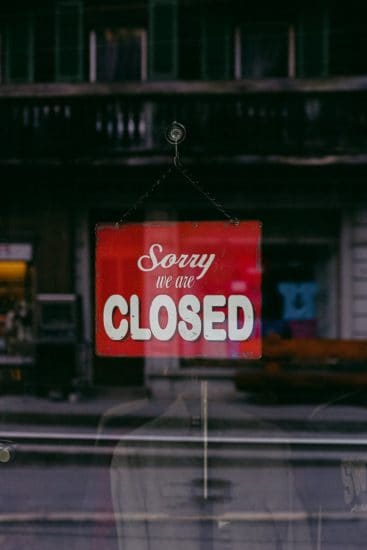Dysfunctional family systems are ‘closed’ systems that resist integrating information that threatens the accepted family narrative. Family members who have scapegoated you will rarely accept responsibility for their actions, despite how egregious their mistreatment of you has been. Acknowledging that they have treated you in an unfair, unjust, cruel, or abusive manner would require a great amount of humility, along with a large dose of ego strength – two ingredients that dysfunctional or narcissistic family members controlling the family system’s ‘scapegoat narrative’ seldom have. Below are five reasons why you are unlikely to ever receive an apology from your family for their shameful treatment of you.

You can now subscribe to the new FSA Education YouTube channel to be notified of my videos on family scapegoating abuse, as well as my next live-stream dates.
If you are someone who survived your dysfunctional, toxic, or abusive family dynamics by ‘fawning’ and submitting, saying “I’m sorry” may be second nature to you. In fact, you by now may have realized that your willingness to take responsibility for anything that anybody is upset about is a trauma-based survival response that is no longer serving you today as an adult.
Or perhaps you survived your toxic family dynamics via a ‘fight’ response. Saying, “I’m sorry” to another when warranted may feel a bit harder for you as it could make you feel less safe and more vulnerable emotionally. However, this can generally be worked through during the recovery process as you begin to feel stronger and develop insight into how your ‘fight’ response helped you to cope in a stressful, threatening environment.
The Scapegoating Family and DARVO
If you are currently focusing your time, energy, and resources on recovering from family scapegoating abuse (FSA), you are no doubt used to examining your behaviors, motives, and actions as you learn to take full responsibility for how you are showing up in the world.
While it is commendable that you hold yourself accountable for the mistakes you’ve made, you may feel confused, angry, or sad that family members who have scapegoated you seem unable or unwilling to own their behavior, apologize to you, and make a sincere amends for the sake of healing and preserving family relations.
In fact, you may find that not only are family members unwilling to apologize, they may become highly defensive, aggressive, or combative when you confront them on their maltreatment of you. They may ignore you, punish you by ‘shunning you’, or dismiss your concerns. Alternatively, they may aggressively attack you and villainize you to your face or via a covert smear campaign (i.e., they may spread untrue stories about you in an attempt to make people lose respect for you or question your integrity or sanity).
This is especially likely to occur if the person in your family driving the ‘scapegoat narrative’ about you is a narcissist. To learn more about victims being re-victimized by their offender, read Dr. Jennifer Freyd’s article on DARVO (‘Deny, Attack, Reverse Victim and Offender’).
Why Your Family Is Unlikely to Ever Apologize to You
The research I’ve conducted on family scapegoating abuse revealed five primary reasons why family members will rarely apologize for scapegoating one of their own. For most FSA adult survivors, the sense of injustice experienced from not having the harm done to them acknowledged can become a ‘stuck’ point in their recovery, which I discussed in a recent article.
Reason One: Your family is dominated by someone with narcissistic traits or full-blown Narcissistic Personality Disorder (NPD) who holds a great deal of power within your family system. In order to remain aligned with this family power-holder, siblings and other relatives will need to “drink the Kool-Aid”, i.e., they must adopt and promote the story or what I call the false “scapegoat narrative” this dominant family member has about you, including your supposedly being a “loser,” “selfish,” “crazy” or “a narcissist”. (To learn more about narcissistic family systems, read my article on narcissistic family abuse).
Reason Two: Your family is unconsciously participating in something that is akin to a shared psychosis or consensus trance fueled by a family projection process that is based on the narrative that there is something wrong with you (the scapegoated child / FSA adult survivor). Specifically: My research on FSA revealed that scapegoating is particularly intense in families who unknowingly suffer from dynamics rooted in unaddressed intergenerational trauma. My research also suggests that when these traumatized family systems are also controlled by a parent who is a malignant narcissist, the scapegoating can be particularly extreme and severe due to the fact that such parents are chronically self-absorbed and lack insight and empathy.
Reason Three: Those who have harmed you in your family may be incapable of experiencing (or demonstrating) genuine empathy. They may in fact be threatened by your empathic nature. I say this because my FSA research indicates that it is typically the ’empath child’ that becomes the target of family scapegoating behaviors. This child often finds themselves in the role of either ‘family caretaker’ or the ‘family identified patient’ – or both. If you happen to be the empath (adult) child in a family that is affected by intergenerational trauma, your ability to feel and exhibit (or express) emotion – and your ability to perceive deeper and perhaps unpleasant truths about those in your family-of-origin – can be highly threatening to the system. Like it or not, emotions of any type can make a tightly controlled family feel out of control, and what the system cannot control, it will reject and possibly ‘eject’. (For a powerful example of this type of parental rejection, I encourage you to watch the Academy Award-winning film, Ordinary People).
Reason Four: As incomprehensible as it may seem, family members who mistreat you via scapegoating behaviors may not see anything wrong with their behavior. This is especially likely to be the case if those who are scapegoating you have strong narcissistic traits. In fact, these family members are often committed to treating you as ‘less than’ within your family-of-origin. Apologizing for their shabby treatment of you would require family members to acknowledge the fact of your abuse, and that this abuse (like all acts of abuse) was undeserved. As your scapegoating family members likely have no interest in viewing you as anything other than ‘bad’, ‘wrong’, or otherwise defective (which supports and justifies in their minds their cruel treatment of you), it would likely be impossible for them to admit the harm they have caused.
Reason Five: One or more members of your family are benefiting in some manner from the distorted ‘scapegoat narrative’ attached to you. These are the people who would lose power, status, or control if you were to be viewed in a humane, holistic manner in your family, i.e., as a whole person possessing both strengths and weaknesses, (versus your being “crazy,” “a liar,” etc). These benefits may not seem obvious upon initial examination, but after working with FSA adult survivors for over 20 years in my psychotherapy and coaching practices, I can assure you that this is nearly always the case. For example, you may have been called “unstable” and “a liar” by a parent or sibling who sexually abused you when you were young. The benefit to them is that you are discredited and would not be viewed as a reliable reporter if you were ever to expose the abuse to someone within or outside of the family. And certainly, in such cases, you would be unlikely to receive an apology for something that is unlikely to ever be acknowledged by the family member that sexually abused you (this would also be the case for any family members that were aware of the abuse and did nothing to stop it or protect you).
Reclaiming Your Life Despite Painful, Unchangeable Realities
I tell each person who comes to me for assistance with family scapegoating issues that recovery and healing is indeed possible, even if your family never acknowledges the mental and emotional pain they have caused you throughout your life.
However, it is no walk in the park, and you will no doubt need to move through many painful feelings, including ‘righteous rage’ regarding the injustices you have experienced, as well as grief over your many losses, including lost family connections if you choose to end contact to protect and preserve your emotional and mental health.
Eventually, if you stay true to the course and do not give in to feelings of hopelessness and despair, you will find yourself moving into a state of ‘radical acceptance’ regarding your family situation. It is from this place that you will be able to affirm whatever difficult choices and decisions you have had to make to ensure that your life is free from abuse.
You will also be able to radically accept that the apology you deserve for having been subjected to family scapegoating abuse (an apology that you may have repeatedly fantasized about or ruminated over for years) will likely never come.
To learn more about radical acceptance and family scapegoating, read my article, Radical Acceptance and Family Scapegoating Abuse Recovery.
If you learned something that might help others, consider sharing this article via the social media icons, below.

Leave a Reply to Rebecca C. Mandeville, LMFT, CCTPCancel reply